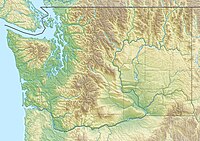Cougar Mountain
| Cougar Mountain | |
|---|---|
| Highest point | |
| Elevation | 1,614 ft (492 m) |
| Coordinates | 47°31′13″N 122°05′36″W / 47.52028°N 122.09333°WCoordinates: 47°31′13″N 122°05′36″W / 47.52028°N 122.09333°W |
| Geography | |
| Location | King County, Washington, U.S. |
| Parent range | Issaquah Alps |
Cougar Mountain is a peak in the Issaquah Alps in King County, Washington. It is part of the highlands in suburban Seattle, and is the lowest and westernmost of the Alps. About two-thirds of Cougar Mountain has experienced residential development, and is home to many neighborhood communities such as Lakemont, but the forested heart of the hill was officially preserved by King County in June 1983 as Cougar Mountain Regional Wildland Park. Cougar Mountain is also home to the Cougar Mountain Zoo.
Cougar Mountain was formed in the Miocene when tectonic forces folded western Washington along a northwest axis and created the Newcastle Anticline. The anticline exposed earlier (Eocene to Oligocene) sedimentary and volcanic rocks that, due to erosion, now form the surface of Cougar Mountain. The northern edge of Cougar Mountain is distinct due to the Seattle Fault, which runs along I-90. The Seattle Fault caused a large earthquake approximately 1100 years ago.
Cougar Mountain is part of the Eastern Puget Uplands level IV ecoregion, as defined by the EPA. This ecoregion is a transition between the ecology of the Puget Sound and the forests of the Cascades. The ecology of Cougar Mountain is thus more similar to the Sammamish Plateau than the rest of the Issaquah Alps.
Cougar Mountain contains species and habitats that were once common closer to Puget Sound. Extensive logging has rendered the ecosystem less diverse than its original state.
Cougar Mountain is home to some of Seattle area radio station's transmitters. These include:
...
Wikipedia

